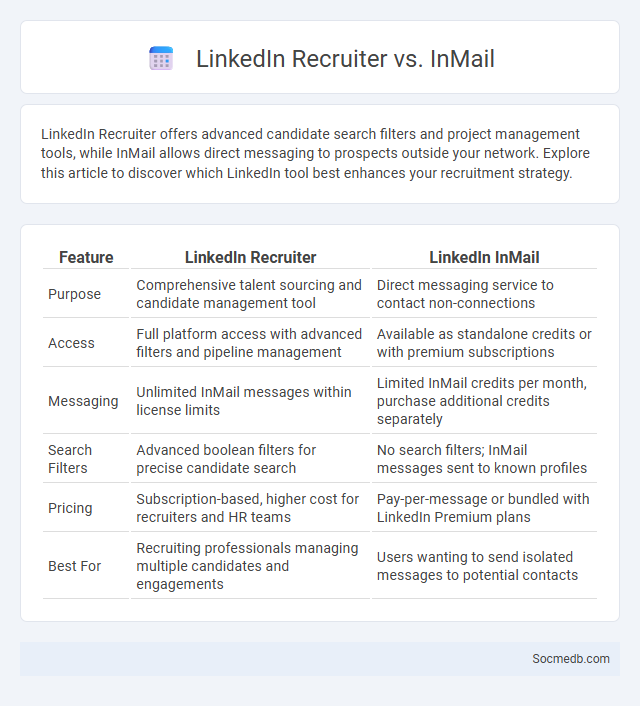
Photo illustration: LinkedIn Recruiter vs InMail
LinkedIn Recruiter offers advanced candidate search filters and project management tools, while InMail allows direct messaging to prospects outside your network. Explore this article to discover which LinkedIn tool best enhances your recruitment strategy.
Table of Comparison
| Feature | LinkedIn Recruiter | LinkedIn InMail |
|---|---|---|
| Purpose | Comprehensive talent sourcing and candidate management tool | Direct messaging service to contact non-connections |
| Access | Full platform access with advanced filters and pipeline management | Available as standalone credits or with premium subscriptions |
| Messaging | Unlimited InMail messages within license limits | Limited InMail credits per month, purchase additional credits separately |
| Search Filters | Advanced boolean filters for precise candidate search | No search filters; InMail messages sent to known profiles |
| Pricing | Subscription-based, higher cost for recruiters and HR teams | Pay-per-message or bundled with LinkedIn Premium plans |
| Best For | Recruiting professionals managing multiple candidates and engagements | Users wanting to send isolated messages to potential contacts |
Introduction to LinkedIn Recruiter, InMail, and Talent Acquisition
LinkedIn Recruiter is a powerful talent acquisition tool designed to help recruiters identify and engage top candidates with advanced search filters and AI-driven recommendations. InMail enables direct, personalized communication with potential hires outside of a recruiter's network, increasing response rates and facilitating efficient candidate outreach. Leveraging LinkedIn Recruiter and InMail accelerates the hiring process by streamlining candidate sourcing, relationship building, and recruitment campaign management on the world's largest professional social media platform.
What is LinkedIn Recruiter?
LinkedIn Recruiter is a powerful talent acquisition tool designed to help hiring managers and recruiters find, connect with, and manage potential job candidates on LinkedIn's extensive professional network. Your recruitment process becomes more efficient with advanced search filters, candidate recommendations, and integrated communication features that streamline outreach and collaboration. This platform leverages LinkedIn's vast database, transforming social media into a strategic hiring resource.
Understanding InMail: Features and Benefits
InMail enables direct messaging to LinkedIn users outside your network, enhancing professional outreach. Key features include personalized messaging, read receipts, and priority delivery, which improve engagement rates. Businesses leverage InMail for targeted recruitment and lead generation, driving higher response and conversion rates.
Talent Acquisition: Definition and Core Principles
Talent acquisition is the strategic approach to identifying, attracting, and hiring skilled professionals to meet an organization's long-term staffing needs through social media platforms. Your ability to leverage social media channels like LinkedIn, Twitter, and Instagram enhances candidate sourcing and employer branding, making recruitment more efficient and targeted. Core principles emphasize building strong talent pipelines, engaging passive candidates, and maintaining a continuous recruitment process driven by data analytics and social media insights.
Key Differences: LinkedIn Recruiter vs InMail
LinkedIn Recruiter offers comprehensive talent management tools for sourcing, managing, and engaging candidates in bulk, while InMail is a communication feature allowing direct messaging to potential candidates outside your network. Your success in recruiting relies on leveraging LinkedIn Recruiter's advanced filters and project management capabilities, whereas InMail boosts personalized outreach with message credits for targeted connections. Understanding these key differences enhances your social media recruiting strategy by optimizing engagement and candidate conversion.
How LinkedIn Recruiter Supports Talent Acquisition
LinkedIn Recruiter streamlines talent acquisition by providing advanced search filters, enabling recruiters to target candidates based on skills, experience, and location. Its integrated messaging system facilitates direct communication with potential hires, enhancing engagement efficiency. The platform's analytics offer insights into candidate behavior and recruitment campaign success, optimizing hiring strategies for diverse industries.
Pros and Cons of Using InMail for Recruiting
Using InMail for recruiting offers targeted outreach to passive candidates, increasing the chance of engaging qualified professionals who may not be actively job hunting. The personalized nature of InMail messages can improve response rates and build meaningful connections, enhancing your talent acquisition strategy. However, the cost per message and potential for low response rates can limit its efficiency, requiring careful budget management and message customization to maximize ROI.
Cost Comparison: LinkedIn Recruiter, InMail, and Traditional Talent Acquisition
LinkedIn Recruiter offers advanced tools for targeted candidate searches, often costing several thousand dollars monthly, while InMail charges per message sent, averaging $0.10 to $1.00 depending on volume. Traditional talent acquisition methods, such as agency fees or job board postings, typically incur upfront costs ranging from 15% to 25% of the new hire's first-year salary or fixed fees, which can be less predictable and higher overall. Your choice depends on budget flexibility and recruitment goals, balancing LinkedIn's precision against traditional methods' broader reach.
Which Tool is Best for Your Hiring Strategy?
Choosing the best social media tool for your hiring strategy depends on your target audience and industry. LinkedIn offers advanced candidate search features and professional networking perfect for corporate roles, while platforms like Instagram and TikTok excel in reaching younger, creative talent through engaging content. You should evaluate each tool's analytics, user engagement, and ad targeting capabilities to maximize recruitment efficiency and find the ideal candidates for your company.
Conclusion: Choosing the Right Recruitment Solution
Selecting the right recruitment solution hinges on leveraging social media platforms to maximize talent acquisition efficiency and reach diverse candidate pools. Effective strategies integrate data analytics and targeted advertising on platforms like LinkedIn, Facebook, and Instagram to enhance candidate engagement and streamline the hiring process. Prioritizing tools that align with organizational goals and offer robust user experience drives successful recruitment outcomes.
 socmedb.com
socmedb.com